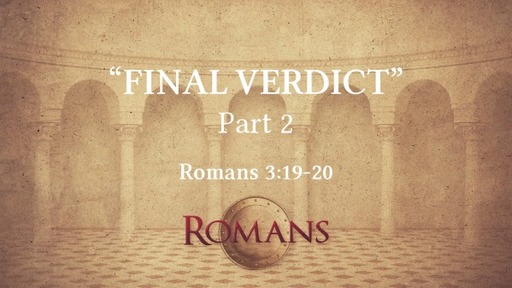"Final Verdict" (Part 2)

Notes
Transcript
Sermon Tone Analysis
A
D
F
J
S
Emotion
A
C
T
Language
O
C
E
A
E
Social
Summary:
What’s the point of the law, if no one can keep it?
What’s the point of the law, if no one can keep it?
...One question, essay test…no sharing or cheating.
It can’t be worthless, and it certainly can’t be bad.
We are almost ready for some good news.
We are almost ready for some good news.
But not quite, in Paul’s estimation.
This is the last section of bad news (vv. 9-20), which is not really “news” (brand new info) at all.
The summary statement is in verse 9 - all under sin.
Last time we considered how the OT scriptures state it (vv. 9-18).
Now let’s consider how the OT law proves it (vv. 19-20).
Who is the law for? (v. 19)
Who is the law for? (v. 19)
First, those who are under the law
Primarily, the Jews (2:12-24; 3:2)
“Under” - in/within, uniquely a part of them
“Law” - Mosaic Law as recorded in the OT scriptures (same “law” as verse 20).
“Says…speaks” uniquely to the Jews. If anyone should listen to them...
So in one sense, the law was just for the Jews. But in another sense it was for...
Second, the whole world
“Stopped” - defenseless in court
“Accountable” liable, condemned
This is the effect - “every” and “whole” - from the law speaking to just those under it.
How does the law speaking to the Jews impact the whole world? (v. 20, for/because…)
What is the law for? (v. 20)
What is the law for? (v. 20)
Not justification
“Works of the law” - doing, obeying, keeping
“Justified” - to render righteous
Render - declare, make, establish, change (in title and position)
Righteous - right standing before God, right relationship to God (“in his sight”; Romans 8:30; 1 Corinthians 6:11).
And those whom he predestined he also called, and those whom he called he also justified, and those whom he justified he also glorified.
And such were some of you. But you were washed, you were sanctified, you were justified in the name of the Lord Jesus Christ and by the Spirit of our God.
So the law, in speaking the the Jews, shows/demonstrates that no one can attain a right standing before God, by keeping the law.
This is why it was important to prove to even a Gentile audience that Jews are just as guilty as the rest.
Knowledge of Sin
The law had an entirely different purpose/function.
“Knowledge” - recognition, to be able to identify sin
It is for acknowledgment of personal sin (Romans 7:7–8).
What then shall we say? That the law is sin? By no means! Yet if it had not been for the law, I would not have known sin. For I would not have known what it is to covet if the law had not said, “You shall not covet.” But sin, seizing an opportunity through the commandment, produced in me all kinds of covetousness. For apart from the law, sin lies dead.
So we can see our need for something else (Galatians 2:16).
yet we know that a person is not justified by works of the law but through faith in Jesus Christ, so we also have believed in Christ Jesus, in order to be justified by faith in Christ and not by works of the law, because by works of the law no one will be justified.
So, how’d you do on the test?
What’s the point of the law, if no one can keep it?
Justification?
Justification?
Is it attainable? If so, how?
Does this makes sense to you? Do you want it to make sense to others?
Benediction: Romans 11:33–36 “Oh, the depth of the riches and wisdom and knowledge of God! How unsearchable are his judgments and how inscrutable his ways! “For who has known the mind of the Lord, or who has been his counselor?” “Or who has given a gift to him that he might be repaid?” For from him and through him and to him are all things. To him be glory forever. Amen.”
Scripture Reading: 1 Timothy 1:1–17
FOR NEXT WEEK:
Paul’s finally getting around to explaining 1:17.
If, everyone’s sinful, and no one’s righteous...
Then, explain how “the righteous shall live by faith.”
